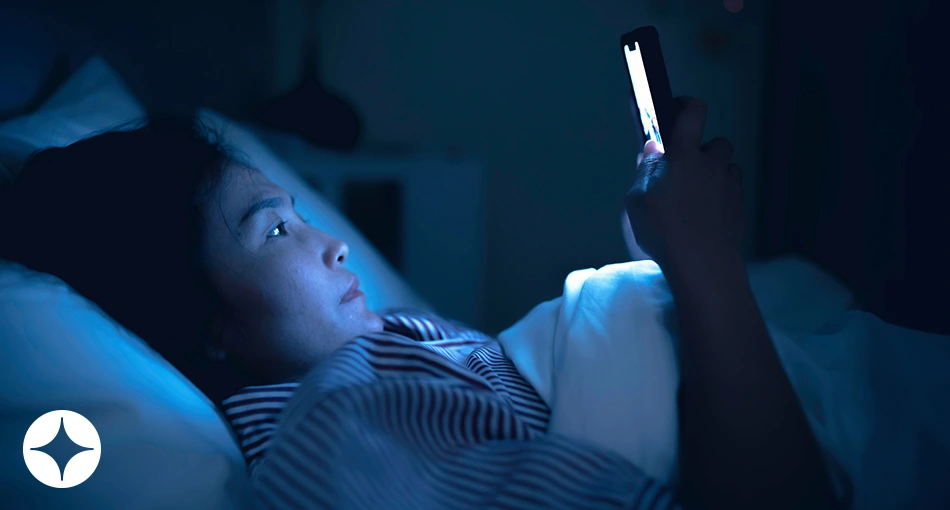
Many authorities have long stated that screen time before bed impacts sleep1. However, new research claims that the reasons may not be as previously thought. In the past, scientists and medical professionals have partially blamed blue light for keeping people awake2, stating that it may disrupt melatonin3 production, a hormone vital for keeping the sleep-wake circadian rhythm4 in sync. A recent study suggests that blue light may not be the culprit5 and puts forward other explanations for why cell phones, laptops and other devices deprive people of rest. This article discusses new findings and considers why devices are still bad before bedtime.
Overview of Past Research Regarding Sleep and Phone Use
The past few decades have witnessed gigantic leaps in technology, placing even more devices literally at the fingertips of many. Recent years have also seen a significant increase in the number of people experiencing insomnia6 — either through difficulties falling asleep or waking frequently7 throughout the night. Various global studies suggest that screen time and insomnia rates rise at a similar pace8, suggesting links between them.
For example, research conducted in India showed that higher phone use correlates to poorer quality sleep9. Researchers in Turkey found that smartphone use decreases sleep quality10 and increases daytime sleepiness in people who experience migraines. A U.S. survey found that interactive devices, like cell phones, impact sleep11 more than passive technology, such as TVs and radios.
Phones and Blue Light
Past studies have hypothesized that certain wavelengths of light — primarily blue — emitted from screens prevent people from sleeping12. While previous research attributed sleep problems to light, it also found that delays drifting off were relatively short13.
Recently, however, several researchers have found little to support claims that blue light has a major effect on sleep. Some scientists suggest that light brightness has more effect than color14. Additionally, studies found little difference between blue or yellow light15 regarding impacts on the circadian rhythm. That's not to say that phones are harmless before bed, though; rather, phones may harm sleep for reasons other than light exposure.
Pros and Pitfalls of Cell Phones Near Bedtime
People regularly report feeling better after limiting cell phone use16 before bed. Positive results include improved sleep, greater morning alertness and less stress.
Various reasons still exist why phones can harm sleep. For example, alerts throughout the night17 may cause pings, buzzes or lit screens, which can disturb and rouse people. Additionally, aimlessly scrolling, chatting and otherwise being distracted by devices may be leading reasons why people sleep later when using their phones in bed.
On the other hand, cell phones may actually aid sleep in specific situations, particularly for youths. Some research suggests that devices can help individuals block out negative thoughts18, which may otherwise cause them to lie awake fretting. For instance, some people find various sleep apps19 beneficial.
To conclude, phones can delay sleep because of distractions and disturbances, rather than the blue light they emit. In some situations, when used carefully, cell phones may even promote sleep. Those struggling to sleep should try reducing phone use before bedtime and, if problems persist, seek professional advice.
References
- Cleveland Clinic – Why You Should Ditch Your Phone Before Bed
- WebMD – Seeing Blue: How Blue Light Can Affect Your Health
- National Center for Complementary and Integrative Health – Melatonin: What You Need To Know
- Healthline – Everything to Know About Your Circadian Rhythm
- Science Direct – A bidirectional model of sleep and technology use: A theoretical review of How much, for whom, and which mechanisms
- National Library of Medicine – A decade's difference: 10-year change in insomnia symptom prevalence in Canada depends on sociodemographics and health status
- Mayo Clinic - Insomnia
- News Medical Life Sciences – Screen Time and Insomnia
- National Library of Medicine – A study on the effect of mobile phone use on sleep
- National Library of Medicine – Effects of smartphone overuse on headache, sleep and quality of life in migraine patients
- National Library of Medicine – The Sleep and Technology Use of Americans: Findings from the National Sleep Foundation's 2011 Sleep in America Poll
- National Library of Medicine – Attenuation of short wavelengths alters sleep and the ipRGC pupil response
- PNAS – Evening use of light-emitting eReaders negatively affects sleep, circadian timing, and next-morning alertness
- Psychology Today – Blue Light May Not Be Keeping You Awake After All
- Nature – Effects of calibrated blue–yellow changes in light on the human circadian clock
- Business Insider – I stopped using my phone before bed — and immediately noticed 4 huge changes to my well-being
- TachRadar – Your phone's blue light won't actually stop you sleeping, according to an expert – but your phone is still the problem
- Oxford Academic – Technology use as a sleep-onset aid: are adolescents using apps to distract themselves from negative thoughts?
- SoClean – Top Sleep Apps for Improving Your Zzzs




